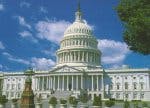Lab groups continue to push hard for Medicare inflation update; controversy brews over rapid HIV test
Groups representing laboratory interests continue to hold their breath over efforts to win an inflation update to Medicare laboratory payments next year. Medicare Part B laboratory fees have not been adjusted to reflect annual inflationary increases since 1997.
So far, Congress has not taken steps to prevent the update from going into effect on Jan. 1, 2003, and laboratories hope lawmakers wont do anything to change that. Congress would have to add an amendment to legislation indicating that the inflation adjustment would continue to be frozen.
There is still a chance Congress could add language to a measure, such as the Medicare giveback bill, during a post-election session scheduled to begin the week of Nov. 11, says Mark Birenbaum, Ph.D., administrator for the American Association of Bioanalysts (AAB).
The Medicare giveback legislation would increase Medicare payments to hospitals, physicians and other healthcare providers. Giveback bills in both the House and Senate would authorize a 2percent increase in Medicare payments to physicians for each of the next three years, from 2003 through 2005.
When Congress adjourned in October to hit the campaign trail, the House had passed its Medicare giveback bill, but the Senate measure had only cleared the Finance Committee. Groups representing the nations physicians are pushing Congress hard to take action before years end.
Depending on the election results, however, its also possible that lawmakers could not get anything done during a lame-duck session because of politics. After the election, pressure is off, Birenbaum asserts. In addition, big gains by either party would cause lawmakers to delay action on a number of legislative items until the new Congress meets in January.
Even so, laboratory groups will be watching closely to make sure that any givebacks to physicians dont take away funding for other healthcare providers such as laboratories, he adds. With regard to other legislative priorities for labs, much to the dismay of laboratories that were pushing for it, little progress was made on efforts to provide an increase in the specimen collection fee.
Controversy brewing over rapid HIV tests
On another front, laboratory groups are joining forces to oppose an effort by AIDs organizations and test manufacturers to seek a waiver from CLIA (Clinical Laboratory Improvement Amendments) for some new rapid HIV tests. Laboratory interests are concerned about untrained individuals administering the tests and the disturbing consequences for individuals who receive inaccurate results.
CLIA regulations define waived tests as simple laboratory examinations and procedures that are cleared by the federal government for home use; that employ methodologies that are so simple and accurate that erroneous results be negligible; or that pose no reasonable risk of harm to the patient if the test is performed incorrectly.
Laboratory interests dont believe the data is there to show that these tests are so accurate that they should be waived, says AABs Birenbaum. Dr. David Sundwall, president of the American Clinical Laboratory Association, points out that CLIAC has advised Health and Human Services Secretary Tommy Thompson that because HIV tests results are of enormous consequences to persons being tested, any false positive or negative poses a substantial risk to persons being tested and their partners.
In addition, groups representing laboratories are opposed to having untrained individuals perform the tests. They believe the tests should be categorized as moderately complex. Under this arrangement, the public health laboratory network throughout the country would receive a limited public health certificate under CLIA.
While the details would have to be worked out, it is envisioned that certified public health workers would administer the tests. Public health departments could set up testing centers in the various neighborhoods, but these would be testing sites that the public health laboratory is overseeing, says Birenbaum. This would ensure that those performing the testing are properly trained and quality control is maintained, he adds.
AIDS groups want the tests to be waived because they believe this would make it more accessible to individuals who may be HIV positive. Under their plan, the tests would be widely available in the community at some unconventional places and outreach centers.
Unfortunately, says Birenbaum, FDA does not require actual field testing in the community to see how the tests perform when untrained individuals administer them. Instead, the government relies on what manufacturers say the tests can do under controlled conditions, he points out.
Under CLIA, if a waiver is granted, the site performing the testing must still enroll in the CLIA program, become certified, pay a certificate fee, and follow the manufacturers instructions for the waived test.
Joan Szabo is a Washington, DC, freelance writer specializing in healthcare issues. She has been writing the Washington Report column for MLO for five years.
December 2002: Vol. 34, No. 12
©
2002 Nelson Publishing, Inc. All rights reserved.



